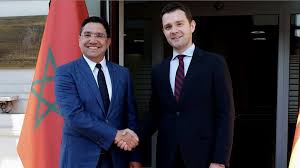
Morocco has reiterated its firm support for the autonomy initiative as the United Nations prepares to release its annual report on the Sahara conflict.
The announcement followed a meeting in New York between Moroccan Foreign Minister Nasser Bourita and UN Secretary-General’s Personal Envoy for the Sahara, Staffan de Mistura.
The meeting, requested by the UN envoy, was attended by Ambassador Omar Hilale, Morocco’s Permanent Representative to the United Nations.
During discussions, the Moroccan delegation emphasized the “unwavering constants” set out by King Mohammed VI, underlining the pursuit of a political, realistic, and pragmatic solution based solely on Morocco’s autonomy plan, while respecting the country’s sovereignty and territorial integrity.
Bourita reaffirmed Morocco’s support for the efforts of the Secretary-General and his envoy to advance the political process.
Morocco’s position comes amid growing international endorsement. Countries including the United States, France, and the United Kingdom have described the autonomy initiative as “the only serious, credible, and realistic basis” for resolving the dispute.
This strengthened consensus is increasing diplomatic pressure on Morocco and other stakeholders to resume meaningful dialogue under UN auspices.
The timing of the meeting is significant, as the Secretary-General’s forthcoming report is expected to evaluate progress in the Sahara political process and call for substantive negotiations among all parties.
In his previous report, António Guterres stressed the importance of good faith engagement from all stakeholders, highlighting the need for tangible commitments toward a lasting settlement.
In contrast, Algeria maintains a position described by observers as “frozen.” Foreign Minister Ahmed Attaf has reiterated support for the Polisario Front’s claim to self-determination, advocating for direct talks between Rabat and the separatist group, while framing Algiers as an “observer country.”
This stance is widely seen as inconsistent with Security Council resolutions, which identify Algeria as a key stakeholder in the Sahara political process.
Morocco’s renewed diplomatic push signals its determination to consolidate international support for the autonomy plan and to advance a negotiated settlement that preserves its territorial claims while addressing regional stability.



